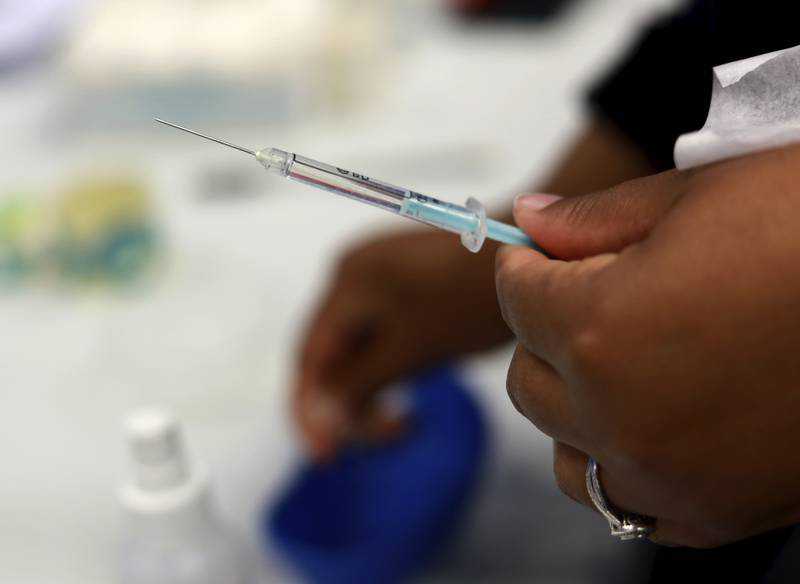South Africa's Omicron patients face mostly mild symptoms, doctor says
02 December, 2021

Doctors say many people who have become ill during South Africa’s rapid increase in Covid-19 cases have mostly mild symptoms.
Most new cases in the country attributed to the Omicron coronavirus variant have been recorded among people aged in their twenties and thirties.
“We’ve seen a sharp increase in cases for the past 10 days. So far they have mostly been very mild cases, with patients having flu-like symptoms: dry coughs, fever, night sweats, a lot of body pains,” said Dr Unben Pillay, a GP in Gauteng province, where 81 per cent of new cases have been reported.
“Most of these patients have been treated at home. Vaccinated people tend to do much better.
"We have not seen a vast increase in hospitalisations, but this is still early days. Hospitalisations often come several days after a rise in confirmed cases.”
Doctors said the 20-30 age group generally had milder symptoms of Covid-19, but that older people infected with the new variant could have more severe illness.
On Monday, countries around the world sought to keep the Omicron variant at bay by imposing travel bans and other restrictions, even as it remains unclear what the strain means for the pandemic.
Japan announced it would bar all foreign visitors from entering the country, while cases of the Omicron variant, first recorded in southern Africa, have now been reported as far away as Hong Kong, Australia and Portugal.
Portuguese authorities were investigating whether some infections there could be among the first reported cases of local transmission of the variant outside of southern Africa.
The seven-day average infection rate in South Africa has surged from about 200 a day to more than 2,000 over the past two weeks.
Omicron appears to be more transmissible than previous variants and the surge in South Africa could bring the daily number of new cases to 10,000 by the end of the week, said infectious diseases specialist Salim Abdool Karim.
“Our biggest challenge will be to stop super-spreading events, particularly indoors."
He has suggested it might be necessary to restrict indoor gatherings to those who are vaccinated against Covid-19.
The area hit hardest by the surge is Tshwane metropolitan area, part of Pretoria, capital of Gauteng province.
The “vast majority” of the people admitted to hospital have been unvaccinated, said Dr Waasila Jassat of the National Institute for Communicable Diseases.
“Of recent hospitalisations, 87 per cent have been unvaccinated,” Dr Jassat said.
Authorities said 455 people were admitted to hospital in the Tshwane area in the past two weeks.
Vaccination appears to have also helped people avoid infection, Dr Jassat said.
Of South Africa’s 60 million people, 16.5 million are vaccinated and the number of fully vaccinated who are testing positive is small, said Nicholas Crisp, acting director general of the Department of Health.
“It is a very small number of those people who tested positive. It’s minute in comparison to unvaccinated people," he said.
To tackle the surge of cases attributed to the Omicron variant, South Africa has urged people to get vaccinated and could make shots mandatory to enter indoor areas, Minister of Health Joe Phaahla said on Monday.
The government is not planning to impose centralised vaccine mandates, but will support businesses and organisations that seek proof of vaccination to enter indoor areas, he said.
The government is considering making inoculation mandatory for health workers, including those who work at state hospitals, he said.
“We are looking at concrete proposals on how to deal with vaccine mandates in workplaces and healthcare workplaces,” Mr Phaahla said.
A few African countries, including Angola, Egypt, Mauritius and Rwanda, have joined the slew of nations that placed travel restrictions on South Africa and other countries in southern Africa over concerns about the Omicron variant.
“It’s quite regrettable, very unfortunate and I’ll even say sad to be talking about travel restrictions imposed by a fellow African country,” said Clayson Monyela, spokesman for the Department of International Affairs and Co-operation in South Africa.
He called the decisions “unwarranted and unjustified because it’s not based on science".
Source: www.thenationalnews.com
TAG(s):
